The Indian Railways saw its gross earnings jump by almost Rs 37 crore on an average each day in the first half of this fiscal compared to corresponding period of the previous fiscal. That is the good news. But here’s the concerning bit: The increased earnings still did not meet the target the Railways had set itself at the beginning of 2018-19, falling short by almost Rs 24 crore daily. And this math is correct if we take the IR’s gross earnings while also including coal haulage due to NTPC – if the NTPC bit is excluded, the gap between actual gross earnings and the target widens considerably, by almost Rs 47 crore daily. The IR has fallen short of its earnings target for some years, as it witnessed an exodus of passengers to other modes of transport and lost its considerable share in the country’s freight market due to skewed tariff policies in the recent years. This skew was corrected to some extent in the last two years with a host of incentives being offered to freight customers, which is why haulage and earnings from freight are showing an upswing. But this improvement has obviously not been able to bring the IR anywhere near its annual earnings target. Besides, even though there has been an increase in passengers in some categories of travel, the overall passenger earnings continue to show moderate growth and this too is largely on account of reserved category of passengers. Remember, almost 66 paise of every rupee earned by the IR comes from freight and issued to subsidise passengers, where the national transporter continues to bear a loss on each seat. [caption id=“attachment_5008881” align=“alignleft” width=“380”]  Representational image. AFP[/caption] It has not raised passenger fares for years and now, as the IR moves towards a further rationalisation of the flexi fare scheme – where fares go up as a certain number of seats fill up across premium trains – there is growing unease over its ability to meet the budget earnings target again this fiscal. There is little likelihood of a fare hike this fiscal, this being an election year. According to IR’s own data, the transporter earned Rs 25,502.33 crore (Rs 24,250.11 crore) from passengers between April and September this year, a growth of 5.16 percent but a shortfall of 2.3 percent over the target for the first half of 2018-19 at Rs 26,108.32 crore. And from freight, gross earnings (when including those from NTPC) were higher by 10.51 percent to Rs 58,495.84 crore (Rs 52,931.7 crore), but short of the target for gross earnings by almost 2 percent. It is interesting to see that almost the entire earnings boost in the freight segment could be coming in from coal, as haulage and therefore earnings from almost all other commodities are either flat or declining during the first half of this fiscal. Coal accounts for nearly half the total freight basket of IR and it earned incremental revenue of over Rs 5000 crore vis-a-vis the same six-month period of 2017-18. Iron ore declined, cement was flat. As for the passengers, the IR suffered a significant loss in passenger numbers during the first quarter as it undertook massive maintenance works – which had been pending from earlier years and were seen causing more deadly accidents if left unattended. This had led to significant train delays as sections of the network remained closed to traffic for many hours at a stretch. At one point, almost three in four passenger mail/express trains were facing a delay. This situation has improved dramatically now, with the network reporting at least 70 percent trains on time and this, in turn, has boosted passenger numbers on the second quarter. But despite trains adhering to better timings, there has been no dramatic surge in either the passenger numbers or earnings. Total passenger earnings between April and September were Rs 25,502.33 (Rs 24,250.11 crore) and a bulk of this increase was due to the reserved category of passengers. It is clear from the earnings so far that IR’s finances for 2018-19 may need a further boost. The total earnings target in the Budget for this fiscal is Rs 2 lakh crore, up from about Rs 1.78 lakh crore (actual) in 2017-18. This means IR will have to generate an incremental revenue of Rs 22,000 crore by the end of this fiscal. It is eyeing about Rs 10,000 crore additional earnings from freight and another Rs 1,000 crore from the flexi-fare scheme. Even if these numbers are achieved, this still leaves a gap of Rs 10,000 crore in the earnings target.
But despite trains adhering to better timings, there has been no dramatic surge in either the passenger numbers or earnings.
Advertisement
End of Article


)
)
)
)
)
)
)
)
)



